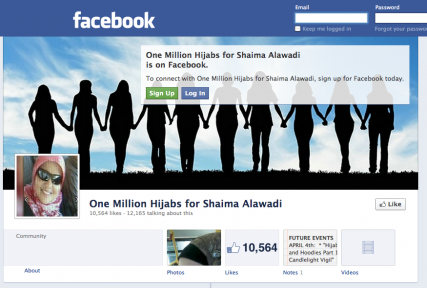
Jean Younis won’t be wearing an Easter bonnet at church this Sunday. Instead, the office manager at Bonita Valley Adventist Church in National City, Calif., will don an Islamic headscarf to support the family and friends of Shaima Alawadi, the Iraqi immigrant and mother of five who died March 24, three days after being beaten in her home in El Cajon, Calif.
“I do expect a reaction, but that's the point. It needs to be discussed,” said Younis, 59, who predicted that most church members would be supportive or respectfully inquisitive.
She is one of many non-Muslim women to post photos of themselves wearing a headscarf on “One Million Hijabs for Shaima Alawadi,” a recently created Facebook Page that had nearly 10,000 likes on Monday (April 2) and hundreds of photos. Others posting on the page have identified themselves as Catholics, Quakers, Mennonites, Jews, Pagans and atheists.
Alawadi, 32, fled Iraq in 1993 and settled in Dearborn, Mich., before she moved to California where she and her husband worked for the U.S. military, providing cultural training.
Supporters worry that because of anti-Muslim sentiment in the U.S., Alawadi's murder, which many believe was hate crime, would be overlooked. Alawadi's killer has not been caught.
“I am a devout Christian and will be wearing hijab as a prayer in April,” wrote Karen Streeter of Pasadena, Calif., next to her photo of herself in a hijab. “Growing up, I was bullied because I was different from others, so I have had a taste of what it is like to be harassed because of how you look.”
“It's really sad also that some people will look at you mean just because you're wearing one,” said Judith Castro, another Facebook poster, describing her experiences wearing a hijab in a 6-minute YouTube video.
Lauralyn Welland Taylor, a Detroit school teacher, wore her hijab for six days, and wrote about it on her Facebook page. “Wearing the hijab promotes conversation unlike anything else. Each day I have had meaningful conversations with individuals whom I have frequent contact, but often little dialogue,” Taylor wrote.
The hijab has been seen as a mark of modesty, oppression, religious identity, and controversy — and now it is becoming a universal symbol of solidarity, much as the hoodie has become a sign of support for Trayvon Martin, the unarmed Florida teenager killed by a neighborhood security guard.
There have also been “hijab and hoodie” rallies at several U.S. universities, including the University of North Carolina at Chapel Hill, North Carolina State University, the University of Michigan at Ann Arbor, and University of California at Irvine.
“They were both killed because of the way they looked,” Younis said of Alawadi and Martin, “and that is so wrong.”








